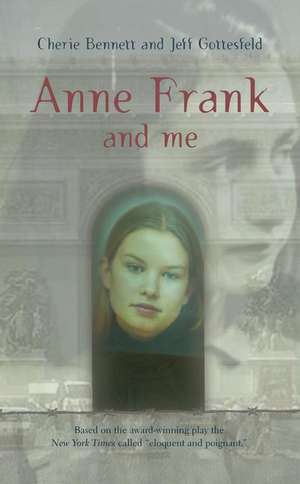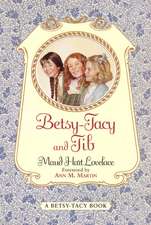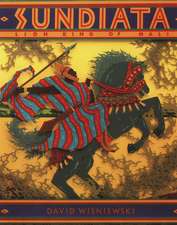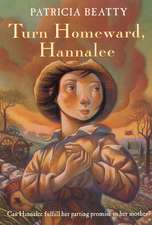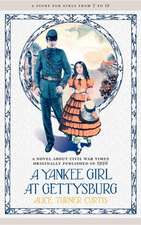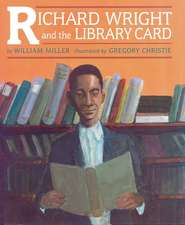Anne Frank and Me
Autor Cherie Bennett, Jeff Gottesfelden Limba Engleză Paperback – 31 oct 2002 – vârsta de la 12 ani
In one moment Nicole Burns's life changes forever. The sound of gunfire at an Anne Frank exhibit, the panic, the crowd, and Nicole is no longer Nicole. Whiplashed through time and space, she wakes to find herself a privileged Jewish girl living in Nazi-occupied Paris during World War II. No more Internet diaries and boy troubles for Nicole-now she's a carefree Jewish girl, with wonderful friends and a charming boyfriend. But when the Nazi death grip tightens over France, Nicole is forced into hiding, and begins a struggle for survival that brings her face to face with Anne Frank.
"This is a powerful and affecting story." (KLIATT)
"This is a powerful and affecting story." (KLIATT)
Preț: 43.42 lei
Nou
Puncte Express: 65
Preț estimativ în valută:
8.31€ • 8.58$ • 6.92£
8.31€ • 8.58$ • 6.92£
Carte disponibilă
Livrare economică 04-18 martie
Preluare comenzi: 021 569.72.76
Specificații
ISBN-13: 9780698119734
ISBN-10: 0698119738
Pagini: 291
Dimensiuni: 107 x 171 x 20 mm
Greutate: 0.18 kg
Editura: Putnam Publishing Group
ISBN-10: 0698119738
Pagini: 291
Dimensiuni: 107 x 171 x 20 mm
Greutate: 0.18 kg
Editura: Putnam Publishing Group
Extras
Chapter Seventeen
18 October 1942
I have wonderful news. C is alive! In today’s post came a card from her. It was unsigned but it is obvious that it is C and that she is living with a Catholic family. I am not going to write her name in case my journal falls into the wrong hands, but here is what the postcard said:
Life is fine in Oradour-sur-Glane. I am planning my wedding to a very plain but intelligent boy. Should we serve smoked salmon or roast chicken? I am studying my catechism every day.
It made me feel so happy to hear from her. She did not write about her father. Perhaps she will send another card soon.
It still eats away at me that Papa was not able to help Mme. and Bubbe E. I remember when I believed he could do anything. I wonder where that innocent—or should I say, stupid—girl went? He made many inquiries with the authorities but he was not able to get them released from either the Vel or from Drancy.
It is amazing to me how normal much of life is. We hear that the movie houses, theaters, and cabarets are full every night, French publishing houses bring out new books by famous writers; there are posters everywhere advertising it all. Many people go to see German entertainers, which I find deplorable. Even if Jews were permitted to go, I would never attend. The slang term “waiter” is used for people who just go about their daily business and wait for the Occupation to end. It seems like it is going to be a very long wait.
I had the most terrible dream last night where Jacques was in love with Suzanne. But he loves me. He does. He comes over almost every day. We go to my room and kiss with the door closed. Liz-Bette always hovers outside, and if she doesn’t hear us talking for five minutes she runs and tells Maman. Then Maman finds a pretext to disturb us. I am certain she thinks that we are too young to spend that much time together behind closed doors, but it is not as if life were normal.
There is a war on!
Chapter eighteen
Nicole huddled in her winter coat on the living room window seat, looking down on the rainy, blustery November morning. A few miserable-looking pedestrians fought the elements. Still, her parents allowed her to go outside so infrequently that Nicole would have given anything to feel the rain pelting her.
She checked her watch as the familiar anxious feeling in the pit of her stomach grew. Jacques had promised to come by before he went to school. He was already ten minutes late. A few more minutes and it meant he wouldn't come at all. Though he swore he loved her as much as ever, Nicole was feeling increasingly insecure about their relationship-the less freedom she had, the more insecure she became.
The latest blow was that her father had announced that she and Liz-Bette could no longer go to school because of the danger of a tuberculosis outbreak. It was infuriating. She loved walking to and from school with Jacques, their arms linked. She even loved how some people would stare at them-the handsome blond boy and the Jewish girl with the yellow star. School had been one of the few places the Nazis still allowed Jews to go. Now, her parents-not the Germans-had taken that away from her. How could they? As she stared down at the street, Liz-Bette began to play the violin in her bedroom, the Hatikva theme from Smetana's "The Moldau." Nicole winced at the usual assortment of incorrect notes. "Can you please for once play another song?" Nicole called.
Liz-Bette came into the living room, violin under her arm. "It's the only piece I know by heart. My teacher won't teach me anymore because I'm Jewish. Do you find that fair? Because I don't."
Nicole didn't answer. She looked down the street for Jacques again. It was empty.
"Nicole?"
"What?"
"Do you ever . . . do you ever wish you weren't Jewish?" Nicole finally turned to regard her sister, sitting on the couch. She looked tiny, in two oversized sweaters. “Why are you asking?”
“It would be very terrible, I know it would.” Liz-Bette bit nervously at her lower lip. “I am a terrible person.” Nicole went to sit beside her. "Did something happen?"
“Do you remember Liliane Stryker? She moved here from Belgium. She was the prettiest girl in my form. I was jealous because I thought I was only second prettiest. I thought maybe we were both safe because we have blue eyes and blond hair. But the police came right into our class at school and took her away on a big bus, and we're never going to see her again. Ever since then, I have been wishing I was a Catholic girl so that no one will take me away on a big bus.”
“No one is going to take you away, Liz-Bette.”
“How do you know?”
“Well, for one thing, we are French and they are deporting very few French Jews. You remember what happened with me at the Vel. And for another, Papa has an Ausweis.”
Liz-Bette looked thoughtful. “That's true. I like being Jewish, Nicole. I just don't like being scared. You won't tell Papa?”
Papa has an Ausweis.”
Liz-Bette looked thoughtful. “That's true. I like being Jewish, Nicole. I just don't like being scared. You won't tell Papa?”
“I won’t,” Nicole promised.
The front door opened, and Dr. Bernhardt stepped into the apartment. He had been upstairs writing in his study. “Two tragic faces,” he commented. “Liz-Bette, don't you have schoolwork to do?”
“Yes, Papa,” Liz-Bette said obediently. “Mama is a much harder teacher at home than any of my real teachers were at school.”She trudged off to her room. Nicole went back to the window.
No sign of Jacques. It meant she wouldn't see him until after school at the earliest. Idly, she swiped her index finger along the window glass, writing his name in the condensation that had begun to form.
“You were expecting Jacques, little one?” Dr. Bernhardt asked.
Nicole was afraid that if she answered, she would cry. And she didn't want to cry. So she changed the subject. “Please say you'll let us go back to school soon, Papa.”
“Perhaps you see the humor in that remark. You were never too keen on going to school before.”
Nicole sighed and turned back to the window. It was raining harder than ever.
“Nicole?”
“Yes, Papa?”
“I understand how difficult this is for you.”
Did he really? How could he? No one had taken away every bit of his freedom when he was young.
“Yes, Papa.”
He considered her for a moment. “I am on my way to visit patients at one of the UGIF old age homes. Would you like to come with me?”
“I don't understand. If you won't allow me to go to school because you are concerned about a tuberculosis epidemic”
“That is only a partial truth,” her father admitted. He came to her. "Ever since the Vel d’Hiv roundup, your mother has been terrified of letting you and Liz-Bette out of her sight. I persuaded her to let you girls return to school this fall. But the incident with the Stryker girl was too much even for me. We feel safer with you here. I am sure that your mother will feel relatively safe to have you out with your papa. Will you come with me?"
Nicole readily agreed. She'd go anywhere if it meant getting out of the apartment. She hurried to get her identity card before her father could change his mind.
Dr. Bernhardt took the pulse of an old woman who had broken her hip. She reminded Nicole of Bubbe Einhorn, with a long white braid. "Your pulse is strong and your hip is mending well, Madame Nadler," her father pronounced. “I think you can begin to use a walker in the hallways.”
She nodded. “Thank you, Docteur Bernhardt. I do not know what I would do without this place. And you.” Nicole’s father pulled a chair up to Mme. Nadler's bedside. He asked after her family, as he had done all morning long with each elderly person he had examined. Most were immigrants who spoke poor French, but her father had listened patiently as they poured their hearts out to him. Nicole didn't see how he could bear it.
“They shot my grandson Mounie, Docteur Bernhardt.”
“I am so sorry.”
“He edited The Yellow Star. A so-called friend betrayed him.”
Nicole shuddered. She knew that The Yellow Star was an underground Yiddish newspaper. Her father spoke with Mme. Nadler a little longer, then kissed her on each cheek.
Nicole said a polite good-bye and followed her father into the hall. “Will Mme. Nadler be able to go home soon?”
“Considering what has happened to her grandson, I feel certain that her medical condition will not permit her to leave here.” Dr. Bernhardt looked at Nicole sharply. “Do you understand?” “Do you mean she's safer here, Papa? Can't the Boche—”
A hearty voice called from down the hallway. “Good morning, Docteur Bernhardt!” Coming toward them was a young man so handsome that he took Nicole’s breath away—tall and muscular, with electric blue eyes, glossy chestnut hair, and a cleft in his chin just like Clark Gable's. He wore a Gestapo uniform.
Nicole looked quickly at her father. His face betrayed nothing. “Good morning, Inspector Gruber,” Dr. Bernhardt said politely. The young Nazi’s eyes fell on Nicole. “And who is this lovely young lady?”
“My daughter,” her father said.
“But you must make us a proper introduction,” the young man insisted, in excellent French. “It is not every day that I come upon a sight so lovely in a home for old Jews.”
Dr. Bernhardt hesitated, then said, “Inspector Gruber, may I present my daughter, Mlle. Nicole Bernhardt.” “Enchanted.” The Gestapo officer brought Nicole’s hand to his lips. Only fear kept her from snatching it back and wiping it off on her sweater. “I am the Gestapo liaison to this establishment,” Inspector Gruber explained pleasantly. “But we needn't be so formal. After all, I am not so much older than you, mademoiselle, I suspect. Your age is?”
“Fifteen.”
“Charming. What do you do for enjoyment, Mademoiselle Bernhardt?” Her father took her arm. “If you will excuse us, Inspector Gruber, I still have patients to see.”
“Just another moment, if you please. Your lovely daughter has not had the opportunity to answer my question. Mademoiselle?”
“I . . . see my friends.”
The inspector nodded earnestly. “Friends and family are the most important things. Especially during such trying times. Your father, the famous Dr. Bernhardt, also values his wonderful family and friends. So many people love and respect him so very much. I am sure you are very proud of him.”
“Yes.”
“His contributions to the UGIF are valuable. That is why he has been granted an Ausweis. It would be a terrible loss if he were to disappear. We should be forced to seek out his family and friends-perhaps also your friends-in an effort to locate him. That is how dearly he would be missed.” Dr. Bernhardt took Nicole’s arm again. “We really must be going, Inspector Gruber. I must finish my rounds.”
“Yes, of course.” The German bowed to Dr. Bernhardt and then to Nicole. “It was a pleasure to meet you, Mademoiselle Bernhardt. I hope to see you again soon. By the way, it would be unfortunate should you decide to ignore what I said. You would find your way far more difficult. I bid you both a good day.”
As Nicole’s father steered her away, the Gestapo officer called out once more. “Mademoiselle?”
Nicole stopped. Inspector Gruber walked over, took something from his jacket pocket, and pressed it into her hand. It was a bar of real chocolate, something she hadn't seen in a very long time. “For your little sister,” he told her. “I understand that she is quite a beauty.”
Her father led her down the hallway. When they rounded the corner, Nicole dropped the precious chocolate into a trash bin as if it had been poisoned.
18 October 1942
I have wonderful news. C is alive! In today’s post came a card from her. It was unsigned but it is obvious that it is C and that she is living with a Catholic family. I am not going to write her name in case my journal falls into the wrong hands, but here is what the postcard said:
Life is fine in Oradour-sur-Glane. I am planning my wedding to a very plain but intelligent boy. Should we serve smoked salmon or roast chicken? I am studying my catechism every day.
It made me feel so happy to hear from her. She did not write about her father. Perhaps she will send another card soon.
It still eats away at me that Papa was not able to help Mme. and Bubbe E. I remember when I believed he could do anything. I wonder where that innocent—or should I say, stupid—girl went? He made many inquiries with the authorities but he was not able to get them released from either the Vel or from Drancy.
It is amazing to me how normal much of life is. We hear that the movie houses, theaters, and cabarets are full every night, French publishing houses bring out new books by famous writers; there are posters everywhere advertising it all. Many people go to see German entertainers, which I find deplorable. Even if Jews were permitted to go, I would never attend. The slang term “waiter” is used for people who just go about their daily business and wait for the Occupation to end. It seems like it is going to be a very long wait.
I had the most terrible dream last night where Jacques was in love with Suzanne. But he loves me. He does. He comes over almost every day. We go to my room and kiss with the door closed. Liz-Bette always hovers outside, and if she doesn’t hear us talking for five minutes she runs and tells Maman. Then Maman finds a pretext to disturb us. I am certain she thinks that we are too young to spend that much time together behind closed doors, but it is not as if life were normal.
There is a war on!
Chapter eighteen
Nicole huddled in her winter coat on the living room window seat, looking down on the rainy, blustery November morning. A few miserable-looking pedestrians fought the elements. Still, her parents allowed her to go outside so infrequently that Nicole would have given anything to feel the rain pelting her.
She checked her watch as the familiar anxious feeling in the pit of her stomach grew. Jacques had promised to come by before he went to school. He was already ten minutes late. A few more minutes and it meant he wouldn't come at all. Though he swore he loved her as much as ever, Nicole was feeling increasingly insecure about their relationship-the less freedom she had, the more insecure she became.
The latest blow was that her father had announced that she and Liz-Bette could no longer go to school because of the danger of a tuberculosis outbreak. It was infuriating. She loved walking to and from school with Jacques, their arms linked. She even loved how some people would stare at them-the handsome blond boy and the Jewish girl with the yellow star. School had been one of the few places the Nazis still allowed Jews to go. Now, her parents-not the Germans-had taken that away from her. How could they? As she stared down at the street, Liz-Bette began to play the violin in her bedroom, the Hatikva theme from Smetana's "The Moldau." Nicole winced at the usual assortment of incorrect notes. "Can you please for once play another song?" Nicole called.
Liz-Bette came into the living room, violin under her arm. "It's the only piece I know by heart. My teacher won't teach me anymore because I'm Jewish. Do you find that fair? Because I don't."
Nicole didn't answer. She looked down the street for Jacques again. It was empty.
"Nicole?"
"What?"
"Do you ever . . . do you ever wish you weren't Jewish?" Nicole finally turned to regard her sister, sitting on the couch. She looked tiny, in two oversized sweaters. “Why are you asking?”
“It would be very terrible, I know it would.” Liz-Bette bit nervously at her lower lip. “I am a terrible person.” Nicole went to sit beside her. "Did something happen?"
“Do you remember Liliane Stryker? She moved here from Belgium. She was the prettiest girl in my form. I was jealous because I thought I was only second prettiest. I thought maybe we were both safe because we have blue eyes and blond hair. But the police came right into our class at school and took her away on a big bus, and we're never going to see her again. Ever since then, I have been wishing I was a Catholic girl so that no one will take me away on a big bus.”
“No one is going to take you away, Liz-Bette.”
“How do you know?”
“Well, for one thing, we are French and they are deporting very few French Jews. You remember what happened with me at the Vel. And for another, Papa has an Ausweis.”
Liz-Bette looked thoughtful. “That's true. I like being Jewish, Nicole. I just don't like being scared. You won't tell Papa?”
Papa has an Ausweis.”
Liz-Bette looked thoughtful. “That's true. I like being Jewish, Nicole. I just don't like being scared. You won't tell Papa?”
“I won’t,” Nicole promised.
The front door opened, and Dr. Bernhardt stepped into the apartment. He had been upstairs writing in his study. “Two tragic faces,” he commented. “Liz-Bette, don't you have schoolwork to do?”
“Yes, Papa,” Liz-Bette said obediently. “Mama is a much harder teacher at home than any of my real teachers were at school.”She trudged off to her room. Nicole went back to the window.
No sign of Jacques. It meant she wouldn't see him until after school at the earliest. Idly, she swiped her index finger along the window glass, writing his name in the condensation that had begun to form.
“You were expecting Jacques, little one?” Dr. Bernhardt asked.
Nicole was afraid that if she answered, she would cry. And she didn't want to cry. So she changed the subject. “Please say you'll let us go back to school soon, Papa.”
“Perhaps you see the humor in that remark. You were never too keen on going to school before.”
Nicole sighed and turned back to the window. It was raining harder than ever.
“Nicole?”
“Yes, Papa?”
“I understand how difficult this is for you.”
Did he really? How could he? No one had taken away every bit of his freedom when he was young.
“Yes, Papa.”
He considered her for a moment. “I am on my way to visit patients at one of the UGIF old age homes. Would you like to come with me?”
“I don't understand. If you won't allow me to go to school because you are concerned about a tuberculosis epidemic”
“That is only a partial truth,” her father admitted. He came to her. "Ever since the Vel d’Hiv roundup, your mother has been terrified of letting you and Liz-Bette out of her sight. I persuaded her to let you girls return to school this fall. But the incident with the Stryker girl was too much even for me. We feel safer with you here. I am sure that your mother will feel relatively safe to have you out with your papa. Will you come with me?"
Nicole readily agreed. She'd go anywhere if it meant getting out of the apartment. She hurried to get her identity card before her father could change his mind.
Dr. Bernhardt took the pulse of an old woman who had broken her hip. She reminded Nicole of Bubbe Einhorn, with a long white braid. "Your pulse is strong and your hip is mending well, Madame Nadler," her father pronounced. “I think you can begin to use a walker in the hallways.”
She nodded. “Thank you, Docteur Bernhardt. I do not know what I would do without this place. And you.” Nicole’s father pulled a chair up to Mme. Nadler's bedside. He asked after her family, as he had done all morning long with each elderly person he had examined. Most were immigrants who spoke poor French, but her father had listened patiently as they poured their hearts out to him. Nicole didn't see how he could bear it.
“They shot my grandson Mounie, Docteur Bernhardt.”
“I am so sorry.”
“He edited The Yellow Star. A so-called friend betrayed him.”
Nicole shuddered. She knew that The Yellow Star was an underground Yiddish newspaper. Her father spoke with Mme. Nadler a little longer, then kissed her on each cheek.
Nicole said a polite good-bye and followed her father into the hall. “Will Mme. Nadler be able to go home soon?”
“Considering what has happened to her grandson, I feel certain that her medical condition will not permit her to leave here.” Dr. Bernhardt looked at Nicole sharply. “Do you understand?” “Do you mean she's safer here, Papa? Can't the Boche—”
A hearty voice called from down the hallway. “Good morning, Docteur Bernhardt!” Coming toward them was a young man so handsome that he took Nicole’s breath away—tall and muscular, with electric blue eyes, glossy chestnut hair, and a cleft in his chin just like Clark Gable's. He wore a Gestapo uniform.
Nicole looked quickly at her father. His face betrayed nothing. “Good morning, Inspector Gruber,” Dr. Bernhardt said politely. The young Nazi’s eyes fell on Nicole. “And who is this lovely young lady?”
“My daughter,” her father said.
“But you must make us a proper introduction,” the young man insisted, in excellent French. “It is not every day that I come upon a sight so lovely in a home for old Jews.”
Dr. Bernhardt hesitated, then said, “Inspector Gruber, may I present my daughter, Mlle. Nicole Bernhardt.” “Enchanted.” The Gestapo officer brought Nicole’s hand to his lips. Only fear kept her from snatching it back and wiping it off on her sweater. “I am the Gestapo liaison to this establishment,” Inspector Gruber explained pleasantly. “But we needn't be so formal. After all, I am not so much older than you, mademoiselle, I suspect. Your age is?”
“Fifteen.”
“Charming. What do you do for enjoyment, Mademoiselle Bernhardt?” Her father took her arm. “If you will excuse us, Inspector Gruber, I still have patients to see.”
“Just another moment, if you please. Your lovely daughter has not had the opportunity to answer my question. Mademoiselle?”
“I . . . see my friends.”
The inspector nodded earnestly. “Friends and family are the most important things. Especially during such trying times. Your father, the famous Dr. Bernhardt, also values his wonderful family and friends. So many people love and respect him so very much. I am sure you are very proud of him.”
“Yes.”
“His contributions to the UGIF are valuable. That is why he has been granted an Ausweis. It would be a terrible loss if he were to disappear. We should be forced to seek out his family and friends-perhaps also your friends-in an effort to locate him. That is how dearly he would be missed.” Dr. Bernhardt took Nicole’s arm again. “We really must be going, Inspector Gruber. I must finish my rounds.”
“Yes, of course.” The German bowed to Dr. Bernhardt and then to Nicole. “It was a pleasure to meet you, Mademoiselle Bernhardt. I hope to see you again soon. By the way, it would be unfortunate should you decide to ignore what I said. You would find your way far more difficult. I bid you both a good day.”
As Nicole’s father steered her away, the Gestapo officer called out once more. “Mademoiselle?”
Nicole stopped. Inspector Gruber walked over, took something from his jacket pocket, and pressed it into her hand. It was a bar of real chocolate, something she hadn't seen in a very long time. “For your little sister,” he told her. “I understand that she is quite a beauty.”
Her father led her down the hallway. When they rounded the corner, Nicole dropped the precious chocolate into a trash bin as if it had been poisoned.
Descriere
Whiplashed through time from an Anne Frank exhibit, Nicole finds herself as a privileged Jewish girl living in Nazi-occupied Paris during World War II. When the Nazis tighten their grip over France, Nicole begins a struggle for survival that brings her face to face with Anne Frank.
Notă biografică
Cherie Bennett
